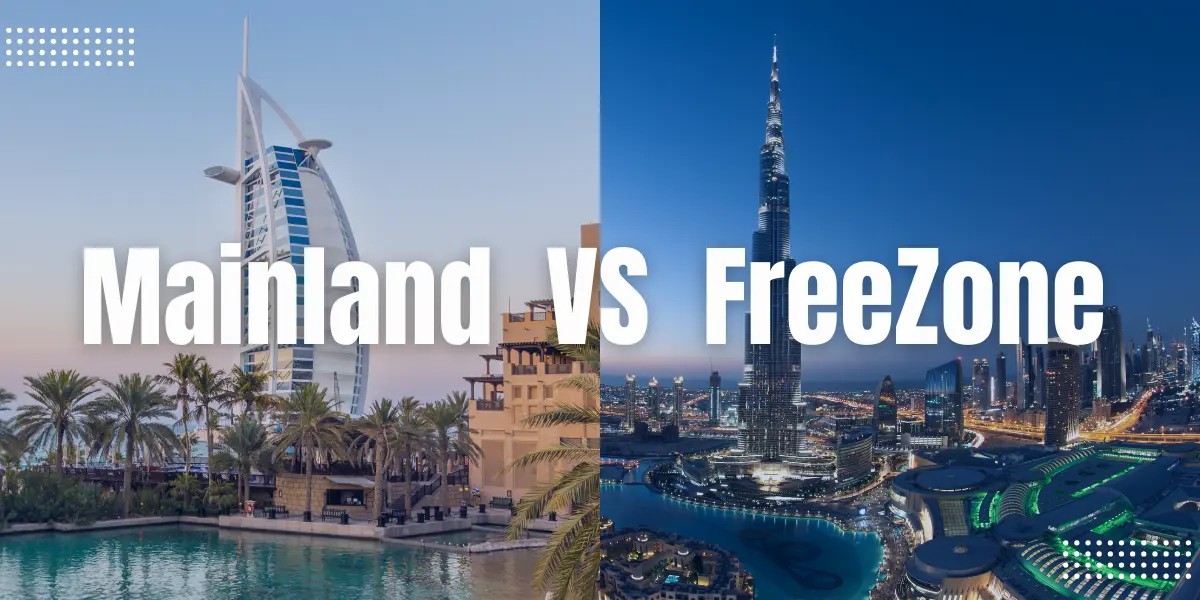
MAINLAND VS. FREEZONE: EXPLAINED
One of the most frequent questions asked by potential clients is: What are the advantages of starting a business in a free zone? What distinguishes a free zone company from a mainland company? This is an important question for every foreign investor or expat who wants to launch a business in the United Arab Emirates.
Three primary commercial jurisdictions are available to prospective entrepreneurs in the United Arab Emirates: Mainland or Onshore, Freezone, and Offshore. Every one of these jurisdictions has advantages, disadvantages, and requirements that must be met. It is crucial to comprehend the distinctions between each of these and then select the option that best fits the objectives and operations of the company.
Mainland Company:
This is just an onshore business that is officially registered with the government of the corresponding emirate. The Emirate’s Department of Economic Development (DED) will grant a trade license. A mainland UAE business benefits from unrestricted trade and business operations. It is able to operate both inside and outside of the United Arab Emirates.
Freezone Company:
Generally speaking, 100% ownership and tax breaks define free zones. There are currently more than 45 free zones spread out around the United Arab Emirates, with the first one opening in the 1980s. The Free Zone Authority, which is each free zone’s independent regulatory body, oversees and manages them all. Every one of these has its own set of rules and laws.
The Difference
Ownership: Up until recently, a foreign investor could only own up to 49% of a mainland company; the Emirati sponsor was entitled to the remaining 51%. However, for businesses incorporated on the mainland, the UAE government currently permits 100% foreign ownership. Such limitations don’t exist in free zones, where foreign investors can benefit immediately from total control. It is not necessary to assign shares to a local sponsor.
Business scope: Fundamentally, businesses operating in free zones are unable to conduct business outside of them without the assistance of a local agent. Companies based on the mainland are exempt from this restriction and are able to operate anywhere in the UAE market.
Office space: In order to be registered, a mainland company needs to have a minimum of 200 square feet of physical office space. Since many free zones let enterprises to establish virtual workplaces, it is not necessary for them to guarantee a physical site.
Visas: There are no visa limitations for mainland businesses; nevertheless, the amount of visas granted varies according to the workplace. Acquiring or leasing a larger office space is necessary in order to obtain more visas. There are limitations on how many visas free zone corporations can apply for, in contrast to mainland companies. The amount of visas that are offered often ranges from one to six, depending on the free zone laws.
Incorporation/Business Set up approvals: For a mainland corporation, multiple government clearances are needed. These consist of the Ministry of Labor, the Municipality of Dubai, the Department of Economic Development, and so forth. In contrast, every free zone has unique rules and legislation that apply to businesses established within its borders. Establishing a free zone firm does not require approvals from different government entities and agencies.
Company audit: At the conclusion of each fiscal year, a financial audit is required of all mainland businesses. Nevertheless, not all free zones mandate that businesses carry out their yearly financial audits. There are free zones where audits are required, and there are others where they are not. This is determined by each free zone’s applicable regulations.
Now that you are aware of the primary distinctions between a mainland and a free zone company, you are in a position to decide where to locate your business. At Elevate, we help investors and company owners launch their ideal companies in both free zones and on the mainland. Please get in touch with us to learn more about the business setup, the specific cost, and the procedure.
For further information, see Offshore company setup.
